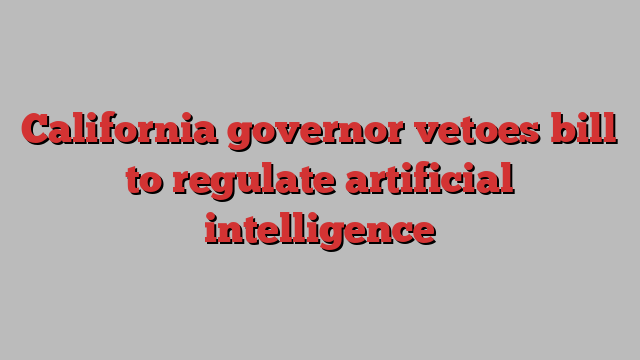
Stay informed with free updates
Simply sign up to the Artificial intelligence myFT Digest — delivered directly to your inbox.
California governor Gavin Newsom has vetoed a controversial attempt to regulate artificial intelligence, citing concerns that the bill could stifle innovation after intense pressure from tech firms.
Newsom, a Democrat, waited until the eleventh hour to announce his decision after the bill passed through the state legislature at the end of August.
The bill would have forced those developing the most powerful AI models to adhere to strict rules, including implementing a kill switch, to prevent catastrophic harm.
Leading AI companies, including Google, OpenAI and Meta, all opposed the bill and lobbied heavily against it, complaining that premature legislation could stifle the development of AI and threaten California’s leading role in the development of the technology. Amazon-backed Anthropic and Elon Musk, who owns start-up xAI, supported the legislation.
In a letter to the state senate, Newsom defended his veto of the Safe and Secure Innovation for Frontier Artificial Intelligence Systems Act, known as SB 1047, on Sunday.
He said the framework could “curtail the very innovation that fuels advancement in favour of the public good”, noting that California was home to 32 of the world’s leading AI companies.
In particular, he said targeting models by size — the bill would require safety testing and other guardrails for models that cost more than $100mn to develop — was the wrong metric. It could give “the public a false sense of security about controlling this fast-moving technology” when “smaller, specialised models may emerge as equally or even more dangerous”.
Senator Scott Wiener, who put forward the bill, said the “veto is a setback for everyone who believes in oversight of massive corporations that are making critical decisions that affect the safety and welfare of the public and the future of the planet”.
He added that companies “aiming to create an extremely powerful technology face no binding restrictions from US policymakers, particularly given Congress’s continuing paralysis around regulating the tech industry in any meaningful way”.
But Newsom insisted that the bill did not take into account whether an AI system “is deployed in high-risk environments, involves critical decision-making or the use of sensitive data”.
“Instead, the bill applies stringent standards to even the most basic functions — so long as a large system deploys it. I do not believe this is the best approach to protecting the public from real threats posed by the technology.”
In the past 30 days, Newsom has signed bills covering the deployment and regulation of generative AI technology — the type that creates text or imagery — including on deepfakes, AI watermarking and misinformation.
Experts on the technology have also partnered with the state to help to develop “workable guardrails” for deploying generative AI backed up by empirical and scientific evidence, he said.
The Artificial Intelligence Policy Institute, a think-tank, called the governor’s veto “misguided, reckless and out of step with the people he’s tasked with governing.”
“Newsom had the opportunity to serve as a leader on regulation of democratic governance of AI development — a path he has taken on other industries — but has chosen to take our hands off the wheel, potentially allowing AI development to veer uncontrollably off the road,” said executive director Daniel Colson.
“Newsom and lawmakers must return to Sacramento next session to come to an agreement on a set of measures that will install sensible guardrails on AI development.”